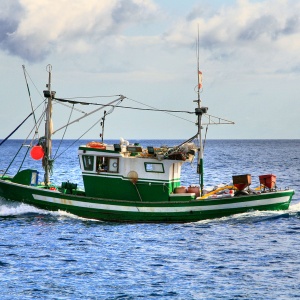
A new paper finds that the global marine fishing fleet produces greenhouse gas emissions equivalent to 4% of the total emissions from global food production. The types of fisheries with the highest emissions intensity per unit of catch are those using motorised craft (vs. non-motorised), those harvesting for human consumption (vs. catches used for meal, oil or non-food uses), fishing for crustaceans (vs. other species types) and fisheries in China (vs. those in other regions).
Thanks to FCRN member Emma Garnett for bringing this paper to our attention.
Abstract
Food production is responsible for a quarter of anthropogenic greenhouse gas (GHG) emissions globally. Marine fisheries are typically excluded from global assessments of GHGs or are generalized based on a limited number of case studies. Here we quantify fuel inputs and GHG emissions for the global fishing fleet from 1990–2011 and compare emissions from fisheries to those from agriculture and livestock production. We estimate that fisheries consumed 40 billion litres of fuel in 2011 and generated a total of 179 million tonnes of CO2-equivalent GHGs (4% of global food production). Emissions from the global fishing industry grew by 28% between 1990 and 2011, with little coinciding increase in production (average emissions per tonne landed grew by 21%). Growth in emissions was driven primarily by increased harvests from fuel-intensive crustacean fisheries. The environmental benefit of low-carbon fisheries could be further realized if a greater proportion of landings were directed to human consumption rather than industrial uses.
Reference
Parker, R.W., Blanchard, J.L., Gardner, C., Green, B.S., Hartmann, K., Tyedmers, P.H. and Watson, R.A., 2018. Fuel use and greenhouse gas emissions of world fisheries. Nature Climate Change, 8(4), p.333.
Read the full article here. See also the Foodsource chapter Food systems and greenhouse gas emissions.
For more details of the environmental impacts of China’s aquaculture and fisheries sector, see Section 9 of the FCRN report Appetite for Change (PDF link) and the Focus on aquaculture (PDF link) paper from the FCRN China Briefings series. Our report Lean, green, mean, obscene…? What is efficiency? And is it sustainable? also contains a discussion of aquaculture and its impacts.







Post a new comment »